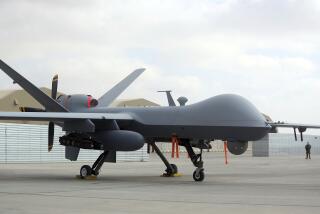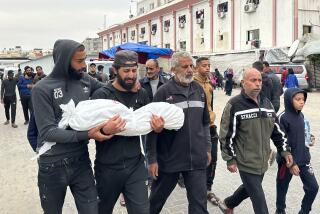‘No-Fly’ Zone Over Bosnia OKd by U.N. : Resolution: Security Council says air combat patrols are an option if Serbs violate the ban.
- Share via
UNITED NATIONS — The Security Council on Friday barred military flights over Bosnia-Herzegovina, where Serbian forces have the only warplanes, and left open the option of authorizing air combat patrols if the ban is violated.
A resolution immediately establishing the “no-fly” zone was adopted by a vote of 14-0, with only China abstaining.
The U.N. Protection Force in Yugoslavia was ordered to monitor compliance with the ban by stationing observers where necessary at airfields throughout the former federation.
Other states were asked to assist, “based on technical monitoring and other capabilities”--a reference to radar and AWACS-type aircraft.
In case of violations, the council said, it will “consider urgently the further measures necessary to enforce this ban.”
The resolution says establishment of the no-fly zone was essential to ensure the safe delivery of humanitarian supplies to the besieged republic and was a decisive step toward ending hostilities.
More than 15,000 people have been killed since the Bosnian Serbs, aided initially by the Belgrade government, took up arms in April to prevent Bosnia-Herzegovina from seceding from the defunct Yugoslav federation.
The U.S. ambassador to the United Nations, Edward Perkins, said the resolution embodied a flight ban agreed to by all parties at a London conference on Yugoslavia in August but still not implemented.
“If . . . the current resolution is violated, my government will move to seek adoption by the council of a further resolution mandating enforcement of a no-fly zone over Bosnia-Herzegovina,” he warned.
British U.N. envoy Sir David Hannay told reporters before the council meeting: “Anybody who thinks that they can flout this ban without being found out is going to be badly surprised. And anybody who thinks that, having been found out, no action will be taken, will also be badly surprised.”
The Bosnian Serbs, largely blamed by the United Nations for sparking the 6-month-old conflict and for driving out other ethnic groups through so-called “ethnic cleansing,” have an estimated 40 aircraft, left behind by the former Yugoslav army. The Muslim-led Bosnian government has none.
The United States had wanted fighter patrols to enforce the ban from the start but was dissuaded by Britain and France, which have troops serving with the U.N. Protection Force.
Like Secretary General Boutros Boutros-Ghali, they fear that clashes with Serbian warplanes that have been raiding civilian and military targets could result in retaliation against U.N. troops.
The U.N. Protection Force has about 1,500 men in Bosnia-Herzegovina, with another 5,000 reinforcements expected in the coming weeks. Some 14,000 other U.N. troops are guarding mainly Serb-inhabited enclaves in neighboring Croatia.
This is the first time the Security Council has established a flight-exclusion zone.
The United States, Britain and France enforce a no-fly ban over large areas of northern and southern Iraq. But this stems from the aftermath of the Gulf War, when Kurdish and Shiite dissidents rose against the Baghdad government, and was not directly authorized by the Security Council.
Air Alert
Although the “no-fly” zone over Bosnia bars flights by Serbian warplanes, for now there are no provisions to stop them.
More to Read
Sign up for Essential California
The most important California stories and recommendations in your inbox every morning.
You may occasionally receive promotional content from the Los Angeles Times.













